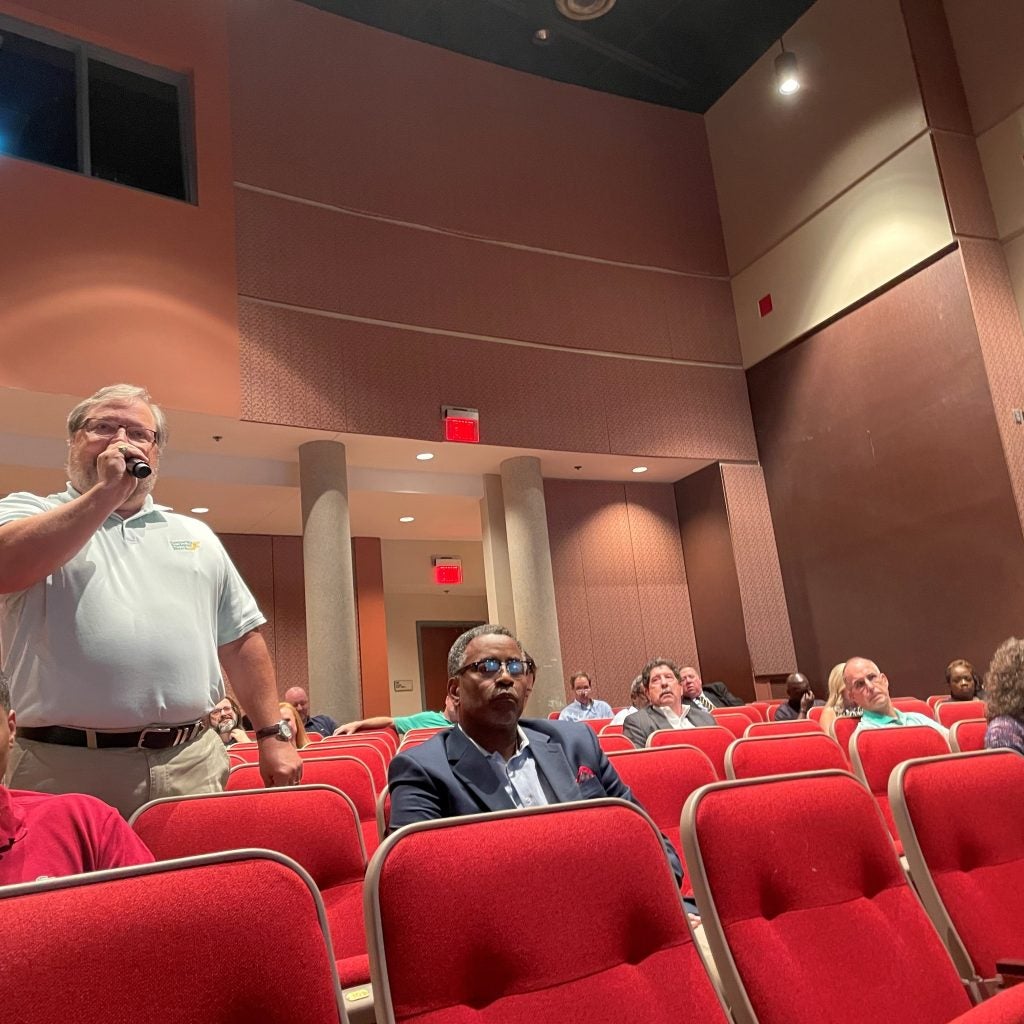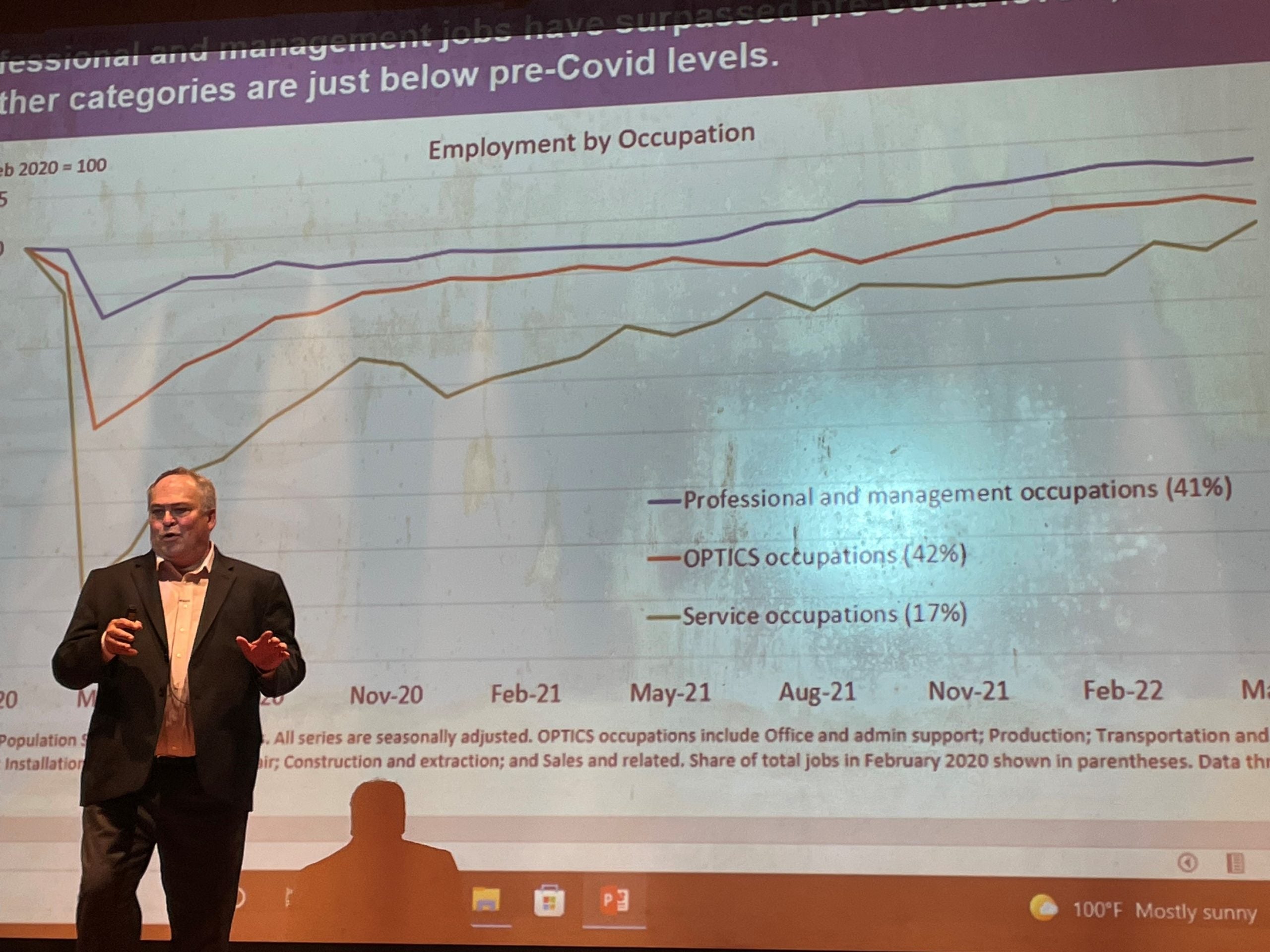The Economic Development Division of Augusta Technical College hosted its second annual Mid-Year Economic Outlook Event on Thursday, June 23 in the Jack B. Patrick Information Technology Center Auditorium on its main campus.
The school welcomed an audience of local business leaders and students to hear a talk on how the nation is doing financially.
“What keeps you up at night? There’s one word, it’s inflation,” said keynote speaker David Altig, beginning his talk with an anecdote after Augusta Tech president Jermaine Whirl asked him that starting question. “There may be other words that are soon to follow, but right now it’s clearly inflation.”
Altig is the executive vice president and director of research at Atlanta Federal Bank. He spoke at Augusta Tech’s inaugural Outlook Event last summer. This year, much of Altig’s lecture was mostly about the inflation developments in the national—and by implication, state and local—economy.
MORE: Augusta Mayor-Elect Garnett Johnson ready to hit the ground running
“We’ve experienced, in little more than two decades, two tectonic economic events,” Altig said. “The global financial crisis and the Great Recession, and we thought we were over that one. We went over it, and then the pandemic, yet. And we sort of thought we were over that one, and now we have a hit of the ‘Great Inflation.’”
The Atlanta Fed economist addressed a wide and intricate range of the causes of the current issues of inflation. One key point of the talk was regarding supply constraints.
“The simple story is, here’s supply, here’s demand, and demand is outpacing supply,” he said. “When demand is bigger than supply, prices rise. Doesn’t get harder than that.”
Using data illustrations, including a graph of the Global Supply Chain Index by the New York Federal Bank, tracking supply pressures from 1997 to May of this year, Altig noted that figures and projections don’t show much progress being made.
Another key point in Altig’s presentation was about tightness in the labor market. Altig noted that the U.S. has yet to recover 100% of the jobs lost as a result of the COVID-19 pandemic. He named three broad job categories: high-skilled, or professional and management roles, which are largely recovered; middle-skill, or “optics occupations,” which ranges from administrative support to construction to sales; and “low-skilled,” or leisure and hospitality roles.
Altig noted skepticism among economists at the Atlanta Fed about these numbers changing soon and more swaths of people filling these job vacancies, partly because people who went into retirement around the pandemic account for much of them.
Some businesses have even been using this as part of their recruitment strategies, Altig said, targeting working arrangements and businesses for those who have gone into retirement.
A brief question-and-answer session commenced after the talk. Among the several business leaders present who asked questions was Security Federal Bank President Phil Wahl who asked about how the Atlanta Fed can assist banks.

“With the role that the Atlanta Fed plays, what is that you do to help us as bankers in the community and getting us where we can go to make more loans?” said Wahl, referring to Security Federal Bank’s national certification as a Community Development Financial Institution, or CDFI.
A CDFI is an institution granted support, via programs, grants, loans and equity investments, by the United States Treasury Department’s CDFI Fund to provide credit and financial services to people of low-income and other underserved communities that typically are not served by traditional financial institutions.
MORE: Location for Augusta Tech’s expanded automotive training facility revealed
Altig responded by noting two issues: the longer-term issue of attracting and channeling the funding to serve the low-to-middle income communities, which the Atlanta Fed assists with via its community development initiatives. The second issue was the difficulty of addressing economic and labor issues with monetary policy, which he called a “blunt instrument.”
“This is this is a story that we sort of struggle with,” Altig said. “The impact of the fight against inflation is not proportionate. It affects different communities differently. The reality of low- and moderate-income populations, is they are vulnerable.”
Skyler Q. Andrews is a staff reporter covering education in Columbia County and business-related topics for The Augusta Press. Reach him at skyler@theaugustapress.com.











